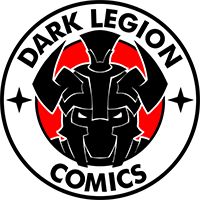Totally 80s Indies – Pacific Comics
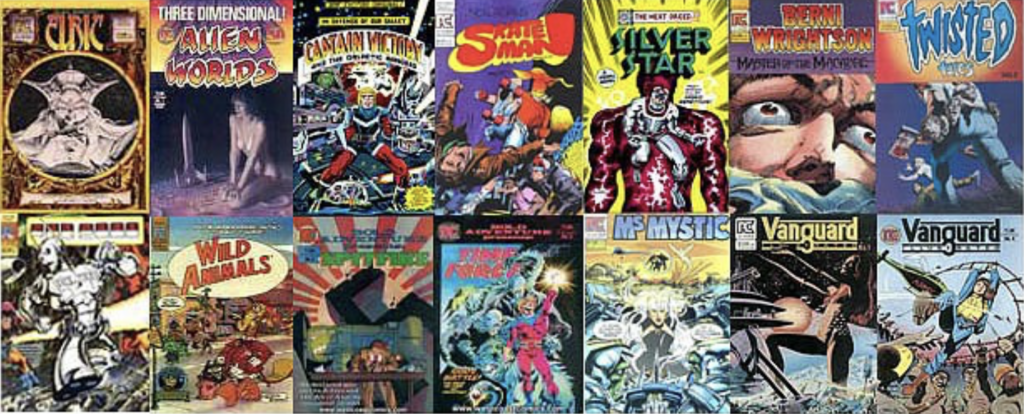
This was genesis.
Pacific Comics was the place where it all started. True, Eclipse is better known today and rose a lot higher before their own crash. Malibu Comics had Ultraforce, Men in Black, and Alien Nation. But without Pacific Comics there would have been no shoulders for them to stand on.
Its origins were about as humble as you can get. Brothers Bill and Steve Schanes started up a mail-order comic book business pretty much in their parent’s garage. It was a back catalog business at first.
Did you have to jump from Superman 389 straight to 391 because your local turnstile ran out of issue 390 early? Call Pacific Comics, they probably have it. San Diego Comicon was within walking distance from their house back then.
The brothers did well enough that they founded their first Pacific Comics bricks-and-mortar store. And promptly discovered how bad the distribution system was back then. However, Phil Sueling had just kicked open the door on distribution so they started their own distribution company serving not just themselves but neighboring comics shops that had started popping up all over the West Coast.
Up until then, it had been a collector’s market, or to be more exact a completionist market. The big ticket titles hadn’t quite turned into those collector’s items just yet but they were getting there.
The Schanes started feeling kind of ambitious. Sure they were doing well, so long as both DC and Marvel were willing to keep playing ball. However, they were keenly aware that if the Big Two ever gathered their marbles and went home they were beyond screwed. Their survival was not up to them.
The easiest way to change that was to start publishing their own comics. After all, they already had their own distribution system set up, and in the 1970s that was the hard part.
Pacific Comics needed to make a splash and for that they needed to find the biggest name that would come on board. Someone whose presence and name recognition would grant the little publisher that could instant credibility.
Jack Kirby had gone into retirement a couple of years before. Not that he really wanted to, but he was so completely fed up with the only game in town that he just didn’t want to play anymore. He was feeling too restricted by both of the Big Two.
The Schane Brothers approached the great man and made him the kind of offer that no one had ever made before. Jack Kirby would be the owner of the IP and have full creative control.
This as it turned out was nearly a disaster because while Kirby was an unparalleled artist, he was a godawful writer.
Captain Victory and the Galactic Rangers finally gave Kirby the chance to finish his Fourth World saga. It was basically the Fifth World. New Genisis and Apokolips had fought it out to mutual annihilation and a new world was created.
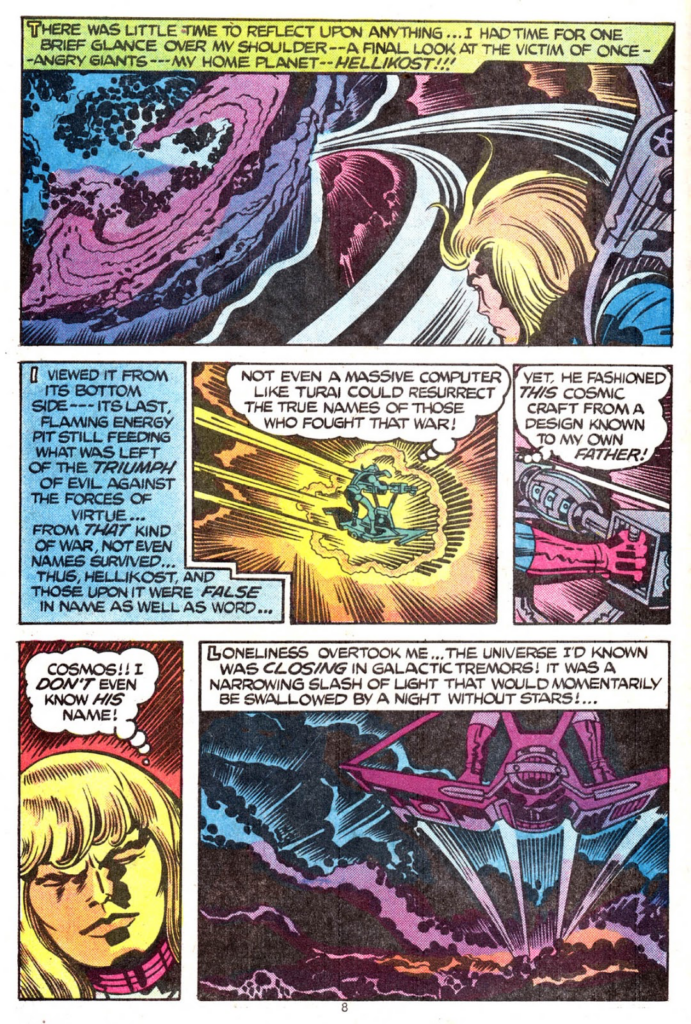
Read between the lines and it’s obvious that in Kirby’s headcannon Captain Victory was Orion’s son.

Meaning that Dark Sied was his grandfather.
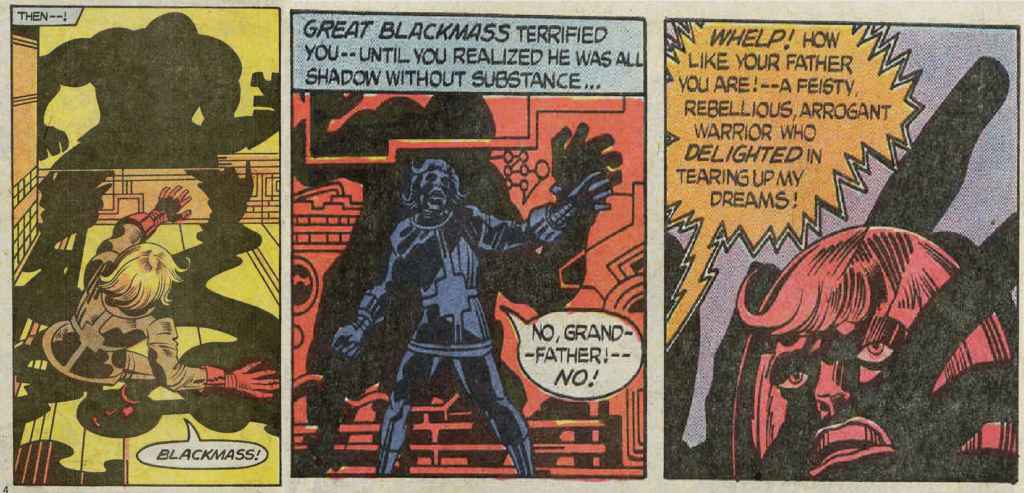
The problem that Captain Victory had was that Kirby was so completely unleashed his art started to suffer for it.
I mean look at this cover, it’s terrible! Captain Victory looks like a pile of build-a-blocks.

Frankly, Jack’s writing was little short of utterly incoherent by the end of Captain Victory’s run.


Not baby you understand but actual fetus
Nonetheless, it did its job and put Pacific Comics on the map. PC was soon pulling in 3.5 million a year and people like Steve Ditko had been lured onboard. John Byrne, Mark Evanier, Bruce Jones, and Neil Adams followed them.
The big attraction for the creatives was that Pacific Comics displayed nothing but contempt for the Comic Book Code. Their distribution couldn’t be threatened because they were the distributor.
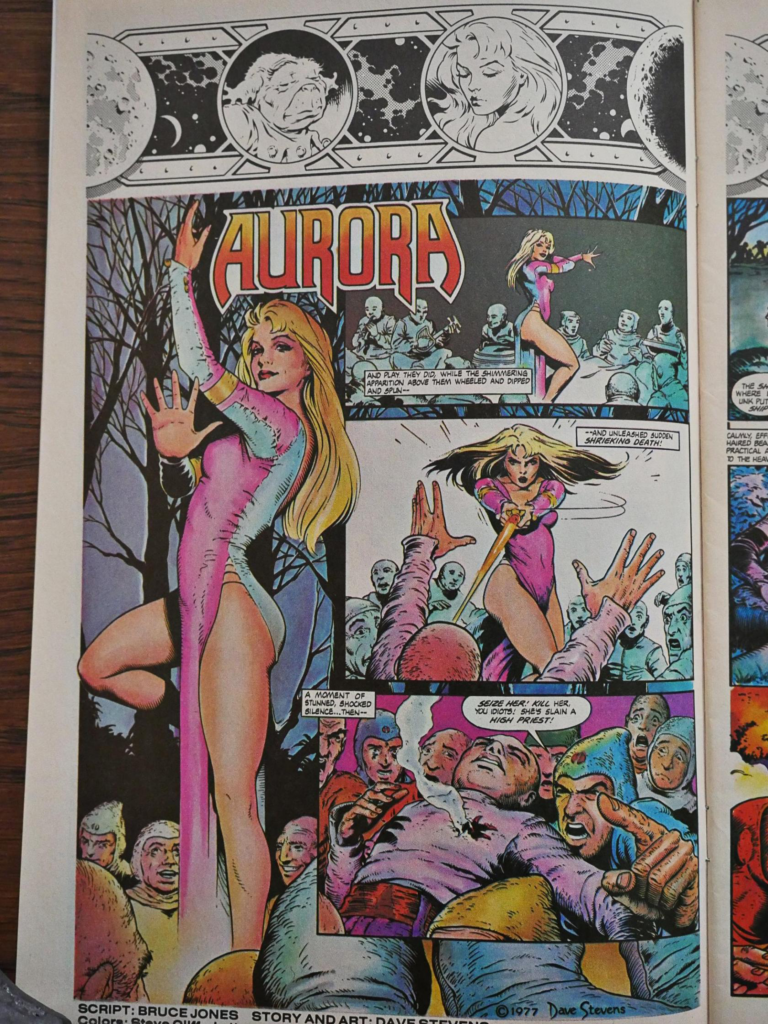
Pacific started publishing Elric comics as an ongoing monthly.

My personal favorite was their Alien Worlds bimonthly anthology.

They also gave Dale Stevens weird little idea about a rocket pack-wearing racing pilot with an absurdly hot girlfriend a shot.
It looked like Pacific Comics was on top of the world. Which is always a dangerous spot to be in because the only place to go from there is downhill.
There were a few stumbles. Skateman by Neil Adams is widely considered to be the worst comic book of all time.

Stumbles like Skateman they could absorb but a major malinvestment was something else.
The fall of Pacific Comics started with a not-unreasonable idea. Pacific tried to bring back 3D comics.
You know what? Strike that, reverse it. 3D anything is always a TERRIBLE idea. It has always failed and until holotanks are figured out it always will. Anyway, 3D comics had been tried in the fifties during the first wave of 3D absurdity but fifties printing technology wasn’t up to it. While 1980s printing technology was now up to the task it was pretty damn expensive.
The novelty sales for 3D were good but they didn’t move enough comics to make a profit on it. Worse still, the creator-owned thing started biting them in the ass when First Comics sniped Elric away from Pacific. That started the house of cards falling, Mike Grell was next to depart. Groo the Wanderer wandered away.
A worse problem was the credit lines they had extended to comic shops that had started popping up everywhere. Pacific Comics was still making a shit ton of money but that doesn’t do you any good if that money keeps arriving after bills and payroll are due. This is called a “cash flow problem” and it is the number one killer of small businesses.
Then the 80s Comics Explosion went off. In the space of two years Pacific Comics went from having no competitors to having fourteen, every damn one of whom was promising Pacific’s creators that they would always pay them first of the month, damn it on time, without fail.
In 1984 the company that had started it all collapsed overnight. By September of that year, Pacific Comics liquidated and the distribution arm was sold to the company that would become Diamond Distribution.
A sad end to be sure but at least there was time to mourn the end of that trailblazer. It allowed Pacific’s passing to stand out in the crowd.
“DON’T THINK OF IT AS DYING, said Death. JUST THINK OF IT AS LEAVING EARLY TO AVOID THE RUSH.” Good Omens by Terry Pratchett and Neil Gaiman

